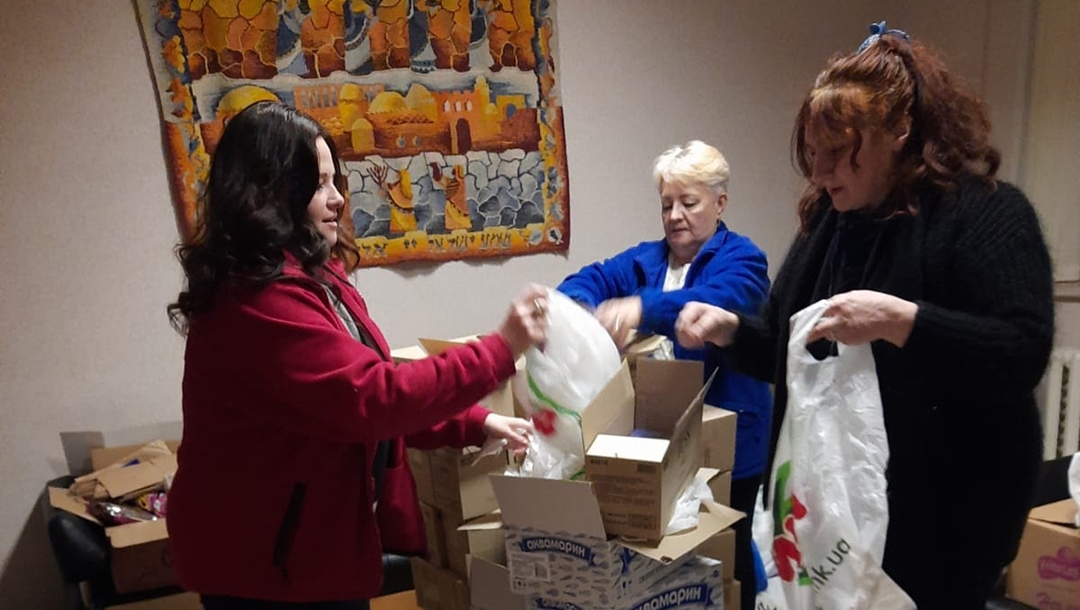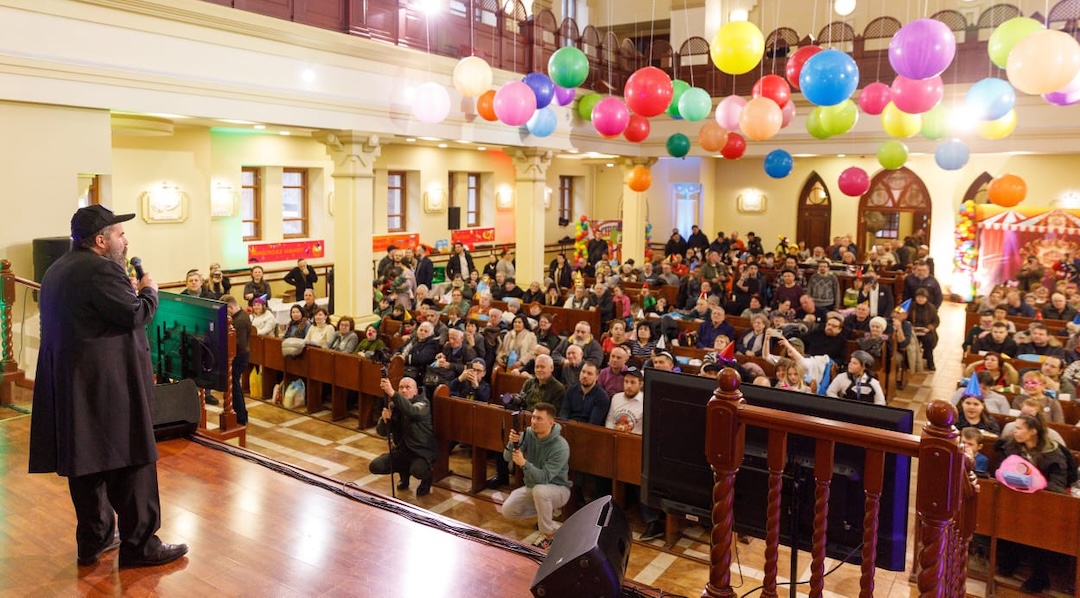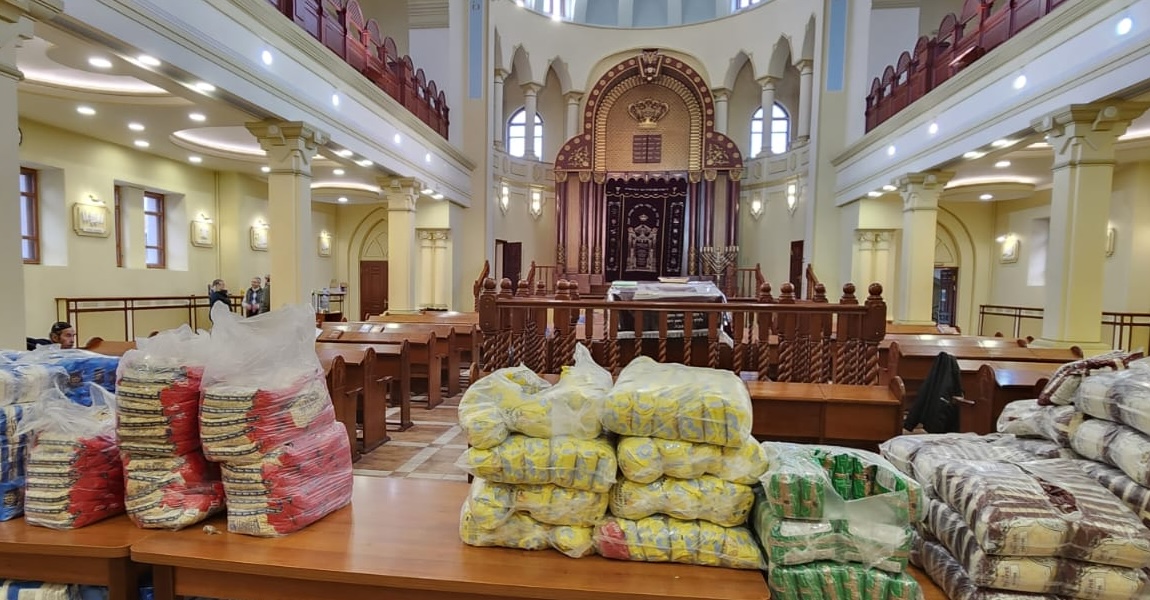(JTA) — As Russia’s invasion of Ukraine enters its third year, nearly all funds raised by Jewish federations for humanitarian relief in Ukraine have run out, according to Eric Fingerhut, president and CEO of Jewish Federations of North America.
After distributing $96 million in aid for relocation expenses, food, and medical care over the past two years, a small reserve remains for emergencies, he said.
But, Fingerhut added, even as relief funding has been drawn down, the federations network continues to help sustain two of the main Jewish organizations offering humanitarian aid in Ukraine, the American Jewish Joint Distribution Committee and the Jewish Agency, with millions of dollars in funding for staff and infrastructure.
“Most of the emergency resources that were raised have already been allocated,” Fingerhut said. “We’re in close touch with our partners to understand what the evolving needs are. And without making specific dollar commitments we have absolutely committed that we’re going to continue to seek to be able to provide them with the support they need.”
At the outset of the war in Ukraine, Jewish organizations raised tens of millions to aid refugees, bring them to Israel and sustain the Jews who remained in the embattled country, estimated at about 40,000. As the war went on, the largest Jewish funding groups signaled they would remain invested in Ukraine, supporting a range of nonprofits on the ground, sending leadership missions and providing updates to their stakeholders.

JDC staff packing matzahs and haggadahs for online seders in Odessa, Ukraine, April 7, 2022. (JDC)
But two years into the war, what began as a flood of donations has slowed to a trickle. And as Jewish organizations’ focus has shifted to the war in Israel, what was once a core priority for Jewish federations has become far more peripheral.
“The major fundraising efforts of the federations in terms of their global commitments have been focused on Israel since Oct. 7, but we have not at all forgotten about Ukraine,” Fingerhut said.
The Israel Emergency Fund organized by JFNA after Oct. 7 has raised more than $780 million, of which more $350 million so far has been earmarked for nonprofits in Israel.
Funding for Ukraine had already slowed before Oct. 7, with $85 million raised by JFNA in the first year after the Russian invasion and just $11 million in the second year of the war. That was appropriate in part because the work on the ground had changed, Fingerhut said. At first, Jewish groups focused on rescue, emigration and resettlement in Israel for those who were interested — all of which were very expensive. At the same time, bringing supplies into Ukraine was made more difficult because of interrupted supply lines that have since been rebuilt.
“There were all these huge expenses at the time, and so funding now isn’t going to be at the time level it was the first year,” Fingerhut said.

Rabbi Moshe Moskovitz of Chabad addresses members of the Jewish community in Kharkiv, Ukraine. (Courtesy of Miriam Moskovitz)
Jewish donors are not the only ones to deprioritize Ukraine over time. The country’s finance minister says donor “tiredness,” including from world governments, is impeding the war effort.
The Jewish fundraising shift has been felt on the ground in Ukraine, where Russian bombardments continue to kill and displace civilians, according to Judi Garrett, the chief operating officer of Jewish Relief Network Ukraine. Affiliated with the Chabad movement, JRNU provides an array of social and humanitarian services throughout the country, which has been funded, in part, by federation dollars over the past two years.
Garrett recalled the early and immediate enthusiasm of donors and how support gradually waned until it almost entirely evaporated overnight.
“War broke out. Everybody wanted to help. Money was coming in from all over the place,” she said.
Chabad was able to spring into action quickly because it had spent decades following the fall of the Soviet Union building a network across the region called the Federation of Jewish Communities. The Ukrainian branch had to quickly reorganize and rebrand as the Jewish Relief Network Ukraine because the previous logo featured a map of the Soviet Union, a newly inappropriate symbol.
Whereas Chabad in Ukraine previously relied solely on their own independent donors, they were now also getting money from the federations.
“It is the first time Chabad really got anything from them, and it made a huge difference in our ability to provide food, medicine, camps, schooling and everything else,” Garrett said.
Slowly, donor fatigue set in and less funding was available. Then, Oct. 7 happened.
“It was a major turning point,” Garrett said. “Nobody’s going to argue that Israel didn’t need tremendous help. People in Ukraine recognize that and they even held prayer vigils in support of Israel. But we saw an immediate pivot, where individual donors even were going to Israel and not Ukraine, and certainly the federations’ strategies changed on a dime. They basically said, ‘Sorry, Ukraine, we have to go help Israel right now.’”
The change hasn’t stopped Chabad from doing its job for the Jews of Ukraine.
“We find a way,” Garrett said. “We lean on volunteers more, we push harder for individual donations, whatever it might be. We definitely are hurting somewhat and really hoping that some federations funding swings back our way.”
JTA has documented Jewish history in real-time for over a century. Keep our journalism strong by joining us in supporting independent, award-winning reporting.






